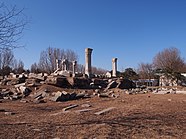Former palace and garden complex in Beijing, China; destroyed in 1860
The Old Summer Palace, also known as Yuanmingyuan (traditional Chinese: 圓明園; simplified Chinese: 圆明园; pinyin: Yuánmíng Yuán; lit. 'Gardens of Perfect Brightness') or Yuanmingyuan Park,[1] originally called the Imperial Gardens (traditional Chinese: 御園; simplified Chinese: 御园; pinyin: Yù Yuán), and sometimes called the Winter Palace,[2][3] was a complex of palaces and gardens in present-day Haidian District, Beijing, China. It is 8 kilometres (5 mi) north-west of the walls of the former Imperial City section of Beijing. Widely perceived as the pinnacle work of Chinese imperial garden and palace design, the Old Summer Palace was known for its extensive collection of gardens, its building architecture and numerous art and historical treasures. Constructed throughout the 18th and early 19th centuries, the Old Summer Palace was the main imperial residence of the Qianlong Emperor of the Qing dynasty and his successors, and where they handled state affairs; the Forbidden City was used for formal ceremonies. The Garden was reputed as the "Garden of Gardens" (simplified Chinese: 万园之园; traditional Chinese: 萬園之園; pinyin: wàn yuán zhī yuán) in its heyday was "arguably the greatest concentration of historic treasures in the world, dating and representing a full 5,000 years of an ancient civilization", according to Robert McGee, chaplain to the British forces.
During the Second Opium War, French and British troops captured the palace on 6 October 1860, looting and destroying the imperial collections over the next few days.[4][5] As news emerged that an Anglo-French delegation had been imprisoned by the Qing government, with 19 delegation members being sentenced to death,[6] the British High Commissioner to China, James Bruce, 8th Earl of Elgin, retaliated by ordering the complete destruction of the palace on 18 October, which was then carried out by troops under his command.[5] The palace was so large – covering more than 3.5 square kilometres (860 acres) – that it took 4,000 men three days to destroy it.[7] Many exquisite artworks – sculptures, porcelain, jade, silk robes, elaborate textiles, gold objects and more – were looted and, according to UNESCO, are now located in 47 museums around the world.[8]







